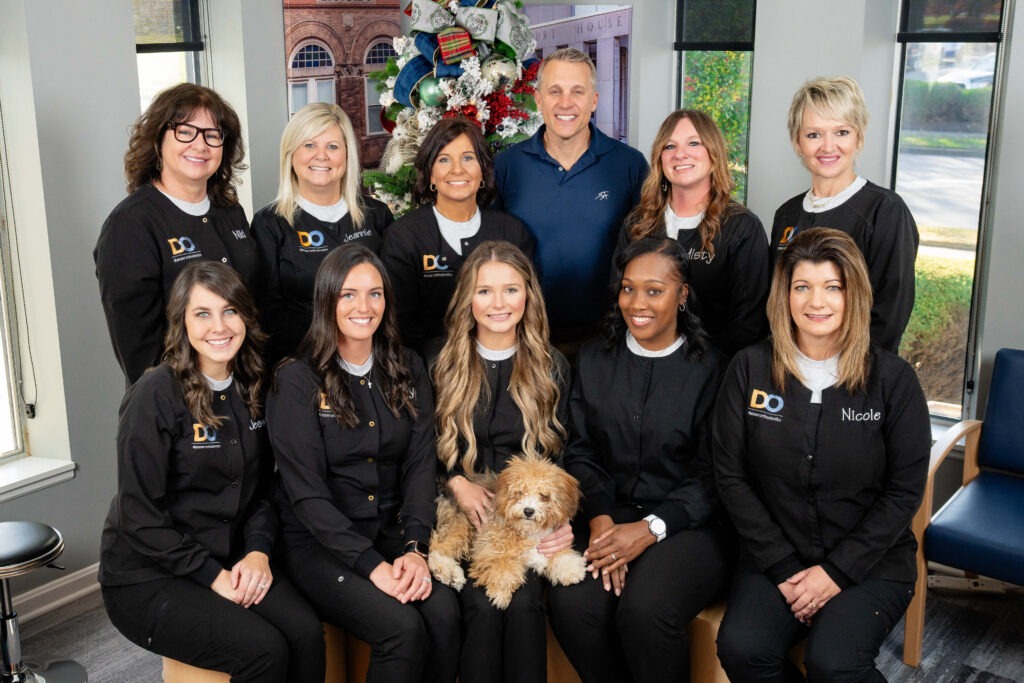
Concerned about how orthodontics can help your bite? Danzer Orthodontics is here for you. We’ve repaired smiles all across Owensboro (and beyond!). Let Dr. Danzer show you why a good bite matters and how orthodontics can help you get there.
Why a Good Bite Matters
Imagine your teeth as a team— a team of players in a game. When everyone’s in the correct position, the game flows smoothly. That’s what a good bite does for your mouth. Do your teeth, jaw, and muscles work in unison? If so, you have a good bite!
A good bite helps you chew food. When your teeth align well, they break down food into smaller, more digestible pieces. This not only makes eating more enjoyable. It also aids in digestion. With a good bite, you don’t have to avoid certain foods because they’re too hard to chew.
When you speak, your teeth play a role in forming sounds. You might need help pronouncing certain words if they’re out of line. A solid bite can be the difference between being easily understood and constantly having to repeat yourself.
But it’s not just about function. It’s also about form. A balanced bite contributes to a healthier, happier smile. When your teeth are in the correct positions, they’re less likely to suffer from issues like uneven wear or chipping. Plus, a well-aligned bite puts less strain on your jaw muscles, making you more comfortable.
Signs Your Bite May Be Off
So, how do you know if your bite is more of a miss than a hit? Some telltale signs can tip you off. For starters, if you’re having a tough time chewing, that’s a big clue. If eating becomes a chore, your bite could be the culprit.
Another sign is gaps between your teeth. Your teeth should be a close-knit community. Do you notice spaces where there shouldn’t be any? Gaps can affect how you chew and even how you talk.
Then there’s overcrowding. Overcrowding can make it hard to clean between your teeth. It sets the stage for dental issues down the road.
Let’s remember jaw noises. If your jaw is popping or clicking when you open and close your mouth, consider it a cry for help. These sounds can indicate that your jaw is working overtime to compensate for a misaligned bite.
Last but not least, if you find yourself frequently biting the inside of your cheek or tongue, it’s another sign that your bite is off. Accidental bites can happen to anyone. But your teeth may need attention if it’s a regular occurrence.
Types of Bad Bites
Bad bites aren’t all the same. There are several types, each with its quirks and challenges. Understanding what you’re dealing with is the first step toward a solution.
Overbite: Picture a lid out of place on a jar—that’s what an overbite resembles. Your top teeth overlap your bottom teeth. Sometimes, so much so that the lower ones are hardly visible. We expect a slight overbite. However, a significant one can lead to gum irritation and wear on the lower teeth.
Underbite: This is the opposite of an overbite. Your lower teeth rest in front of your upper teeth. It’s like they’re cutting in line, and that’s not good manners in the world of bites. An underbite can make chewing more complicated than it needs to be. And it might even affect your speech.
Crossbite: This mix of overbite and underbite but in different areas of your mouth. Some upper teeth tuck inside your lower teeth, while others sit outside. It’s like your teeth can’t decide where they want to be. A crossbite can lead to uneven wear and even bone loss.
Open Bite: When you close your mouth, your front teeth don’t meet, making it tough to bite into foods like pizza or sandwiches. An open bite can also contribute to speech issues, like a lisp.
Spacing: This is when you’ve got gaps between your teeth. It’s like they’re standing far apart in a group photo when they should be huddled together. Spacing can lead to food getting stuck. Moreover, it can make your gums prone to irritation.
Crowding: The opposite of spacing. Crowding is when your teeth are so close together that they start to overlap. Crowding can make cleaning between teeth difficult, increasing the risk of cavities and gum disease.
These bad bites have challenges, but the good news is they’re all fixable. The first step is recognizing the issue, and the next is consulting an orthodontist to explore your options.
Why You Should Consider Fixing Your Bite
So, you’ve spotted some signs that your bite is off or identified the type of bad bite you have. The next question is, why should you bother fixing it? There are some of Dr. Danzer’s most compelling reasons.
First, let’s consider eating. A misaligned bite can turn mealtime into a struggle. Fixing your bite means enjoying a wider range of foods without any hassle. No more avoiding your favorite crunchy or chewy treats.
Next, your appearance matters. A balanced bite contributes to a more symmetrical and appealing smile. It’s not just about looking good in photos. It’s about feeling confident in everyday interactions. When you’re not worried about hiding your teeth, you’re free to smile more, and that’s always good.
Comfort is vital. A bad bite can stress your jaw muscles, leading to discomfort or even pain over time. Correcting your bite can relieve this strain, making everything from talking to yawning more comfortable.
A good bite is easier to clean. When your teeth are correctly aligned, brushing and flossing are simpler. Thus, you will reduce the risk of cavities and gum disease. In the long run, a better bite can save you time and money on dental care.

Good Bites Done Right At Danzer Orthodontics
Appliances from Danzer Orthodontics in Owensboro can work wonders for your bite. Click here to schedule a free consultation with Dr. Danzer.
